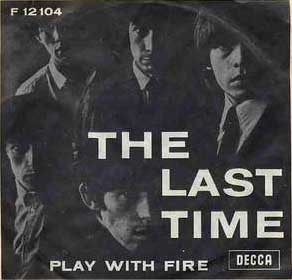| Notes and Quotes: "Play with Fire" |
 |
| Richards:
Oldham was never a blues man, which was one reason he couldn't connect
with us. But a lot of things like "Spider and the Fly" were
cut at the end of a session, while some guy was sweeping up. "Play
with Fire" is like that, with Phil Spector on tuned-down electric
guitar, me on acoustic, Jack Nitzsche on harpsichord, and Mick on tambourine
with echo chamber. It was about seven o'clock in the morning. Everybody
fell asleep. (Greenflied 1981: 168a) (Rolling Stone, 1971). |
|
| 1965 was a year of experimentation
for Jagger and Richards as composers. We have already heard how they modified
the blues idiom in which they had been working with Richards' riff-anchored
"Satisfaction." |
| Oldham's successful ploy to
portray them as naughty degenerates encouraged them to recreate an image
of Edwardian England, an age when extravagance and wealth allowed members
of the ruling class to ignore the social mores they pretended to uphold.
In this marketing, rock stars became effete dandies given to appetites
for sex and drugs. The image was sometimes not far from the mark. |
| "Play with Fire," with its
numerous references to London geography (e.g., St John's Wood, Stepney,
and Knightsbridge) was intended for British domestic consumption, challenging
the existing class structure. The singer warns his lover (someone of obviously
high economic and social standing) that despite her social rank, she (and
her mother) can be brought down. Moreover, the singer suggests that it
is his sexual power that will be her (and their) undoing. The image draws
upon conventions of the blues where the singer wields power over a lover
through manipulation of magical powers (e.g., "I've Got My Mojo Working"
or "I Put a Spell on You"). Of course, this also plays to what would become
one of Jagger's themes: the male domination of women. |
| Jagger, Richards, and Oldham
probably had both American and British audiences in mind. Americans (indeed
most of Western popular culture) was focused on British culture in 1965.
British singers replaced their attempts at sounding American with a British
accent (and it often did not matter which kind of British accent, since
the vast majority of Americans did/do not know the difference between
accents). That this recording was made in Hollywood and was unreleased
as single in UK is indicative of this curious twist in logic, the same
logic that led Herman's Hermits to cover Music Hall tunes instead of American
R & B. |
|
| Schedule |
|
21 March, 2012
|
